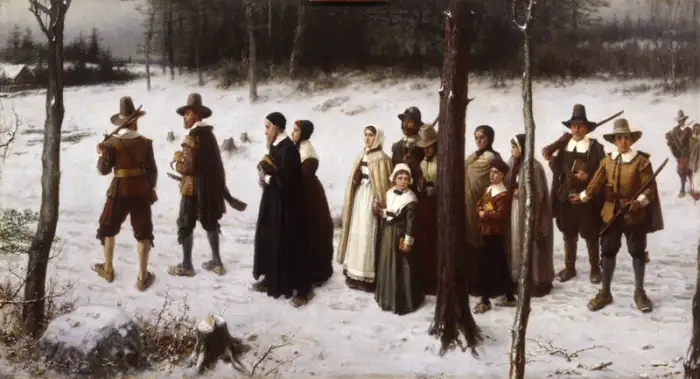Explore the captivating history of the Pilgrims and the Plymouth Colony, where a group of English Separatists embarked on a challenging voyage in pursuit of religious freedom and laid out perhaps of the earliest European settlement in North America.
The story of the Pilgrims and the Plymouth Colony is an enduring narrative of courage, sacrifice, and the pursuit of religious freedom. In the early 17th century, a group of English Separatists, known as the Pilgrims, set sail across the treacherous Atlantic Ocean seeking a new beginning in the New World. The remarkable journey of the Pilgrims, their trials and tribulations, and the establishment of the Plymouth Colony, would play a pivotal role in the early history of the United States.

The Pilgrims: Seeking Religious Freedom
The term “Pilgrims” refers to a group of English Separatists who were members of a religious congregation that rejected the Church of England’s authority and doctrine. Facing persecution in England for their beliefs, they fled to the Dutch city of Leiden in the early 1600s. However, in Leiden, they experienced economic hardships and concerns about losing their English identity. Faced with these challenges, they decided to embark on a daring journey to the New World, where they hoped to establish a colony in which they could practice their faith freely.
The Voyage of the Mayflower
In September 1620, the Pilgrims set sail aboard the Mayflower, a small ship that would become an iconic symbol of their journey. The vessel carried 102 passengers, including Pilgrims, adventurers, and crew members, on a grueling journey across the Atlantic. After 66 days at sea, they spotted land, but not where they had intended. The Mayflower made landfall in November 1620 on the shores of Cape Cod, far north of their original destination in the Virginia Colony. This marked the beginning of a challenging new chapter in their lives.
The Mayflower Compact
To establish order and a legal framework for their new community, the Pilgrims drafted and signed the Mayflower Compact on November 21, 1620. This historic document was a significant early step in the development of self-governance in America. It established a social contract among the settlers, recognizing the authority of government as derived from the consent of the governed. The Mayflower Compact laid the groundwork for the democratic principles that would later shape the United States.
The First Winter: Trials and Losses
The first winter in the New World was brutal and unforgiving. The Pilgrims faced harsh weather conditions, inadequate shelter, and scarce provisions. Many fell ill, and by the end of the season, almost half of the Mayflower’s passengers had perished. The survivors, however, remained resolute in their pursuit of religious freedom and their commitment to establishing a colony in the New World.
The Help of the Wampanoag
In the spring of 1621, the Pilgrims received a stroke of luck and kindness. An English-speaking Native American named Samoset entered their settlement, and he later introduced them to Squanto, a member of the Wampanoag tribe. Squanto proved to be invaluable, teaching the Pilgrims essential skills such as farming, fishing, and building, which were vital for their survival in the challenging environment. The Wampanoag also played a significant role in facilitating a peace treaty between the Pilgrims and Native American tribes.
The First Thanksgiving
The fall of 1621 marked a time of bountiful harvest for the Plymouth Colony, and the Pilgrims invited their Native American allies to join them in a three-day feast of Thanksgiving. This event, often referred to as the “First Thanksgiving,” is considered a symbol of unity, gratitude, and cooperation between the settlers and the Native Americans. It also serves as a precursor to the modern American tradition of Thanksgiving.
The Growth of the Plymouth Colony
Over the years, the Plymouth Colony slowly expanded. New settlers arrived, and the community began to thrive. Agriculture, particularly corn cultivation, became a cornerstone of their economy, ensuring their food security and economic sustainability. The Pilgrims’ focus on hard work, self-reliance, and strong community bonds contributed to their success.
Legacy and Impact
The Plymouth Colony, founded by the Pilgrims, played a crucial role in shaping the future of the United States. Their commitment to religious freedom, self-governance, and cooperation with Native Americans laid the foundation for the principles that would later influence the development of the American nation. The Mayflower Compact, in particular, contributed to the growth of democratic traditions in the United States.
The story of the Pilgrims and the Plymouth Colony is a remarkable testament to the enduring human spirit and the pursuit of freedom and opportunity. The Pilgrims’ journey across the Atlantic, their resilience in the face of adversity, and their collaboration with Native American communities continue to be celebrated as a defining chapter in American history. The legacy of the Plymouth Colony endures as a symbol of the enduring values of self-determination, religious freedom, and cooperation that continue to shape the United States today.
Source : chat.openai.com